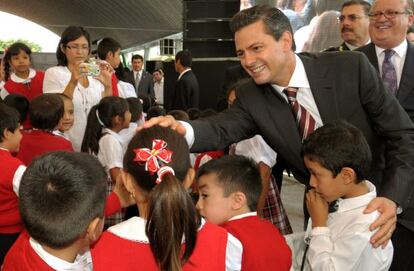Mexico commits itself to launch of gendarme security force
New law enforcement body now to become operational in July 2014


The oft-announced Mexican Gendarmería security force has yet to become a reality. After stating that this new law enforcement body would be officially presented during the military parade of September 16 – Independence Day — the government on Tuesday unveiled that the Gendarmería will in fact not be operational until July 2014.
The announcement was made during the 34th Public Security Council held at Los Pinos, the official residence of President Enrique Peña Nieto. Manuel Mondragón, the national security commissioner, provided further details about a body that he defined as “an institution destined to uphold public security, civilian in nature and command, to reinforce territorial governability in rural and suburban population centers.”
The Gendarmería will be a 5,000-strong division of the federal police. According to Mondragón, 1,710 recruits have already begun their training. At first it was said that the Gendarmería would have 10,000 members, 8,500 from the army and the rest from the navy. The budget earmarked in 2013 for the creation of this body was 1.5 billion pesos (around 121 million dollars).
A few months ago, when it emerged that the government was working on a new law enforcement agency modeled after the Spanish Civil Guard, several Mexican civil society groups requested a “broad, informed” debate regarding the tasks of what is considered one of the cornerstones of Peña Nieto’s security policy. “Technical and organizational changes have been made, taking into account the opinion of social and academic leaders,” said Mondragón.
Why is it expected that the Gendarmería will do things differently? Why will it resolve or contain violence?”
“We don’t have the answer to the most important question: why is it expected that the Gendarmería will do things differently? Why will it resolve or contain violence in particularly unstable areas?” asks Ernesto López Portillo, director of the Institute for Security and Democracy, an organization which has joined others in requesting a public debate. “We believe they are thinking on the one hand about prevention, and on the other about more police. The federal government thinks that more armed police are required, more deployments, and we feel that what’s really needed is a greater prevention strategy, working with the communities to rebuild the social fabric, in a process that should include the police.”
In 2006, Peña Nieto’s predecessor as president, Felipe Calderón, declared war on the country’s drug cartels by deploying army troops in several areas of the country. The result was an escalation of crime which saw an estimated 55,000 people killed during his six-year mandate.
Meanwhile, the president took advantage of the council session to make a small assessment of progress in security issues during his nine months in office. Peña Nieto said that his administration has captured 62 of the 122 most wanted criminals in the country, “in the majority of cases without firing a single shot,” thanks to improved intelligence. He added, however, that the government must not slip into “smugness and self-praise.”
“In the period from December 2012 to July of this year, there was a 20-percent drop in homicides […] compared with the same period in other years,” said the president. Some experts have questioned this figure.
Tu suscripción se está usando en otro dispositivo
¿Quieres añadir otro usuario a tu suscripción?
Si continúas leyendo en este dispositivo, no se podrá leer en el otro.
FlechaTu suscripción se está usando en otro dispositivo y solo puedes acceder a EL PAÍS desde un dispositivo a la vez.
Si quieres compartir tu cuenta, cambia tu suscripción a la modalidad Premium, así podrás añadir otro usuario. Cada uno accederá con su propia cuenta de email, lo que os permitirá personalizar vuestra experiencia en EL PAÍS.
¿Tienes una suscripción de empresa? Accede aquí para contratar más cuentas.
En el caso de no saber quién está usando tu cuenta, te recomendamos cambiar tu contraseña aquí.
Si decides continuar compartiendo tu cuenta, este mensaje se mostrará en tu dispositivo y en el de la otra persona que está usando tu cuenta de forma indefinida, afectando a tu experiencia de lectura. Puedes consultar aquí los términos y condiciones de la suscripción digital.








































